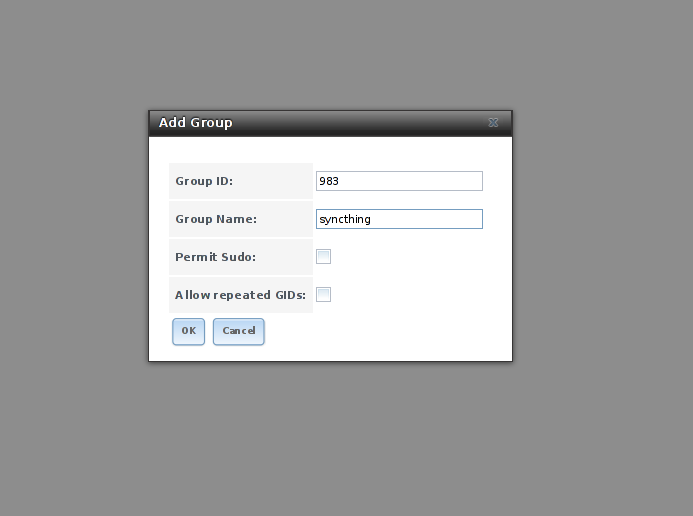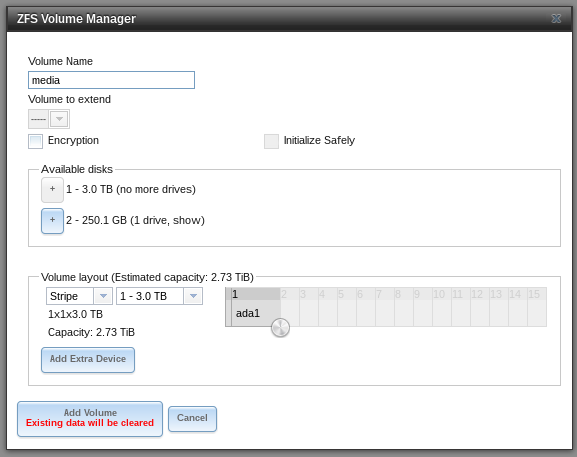

- #Cannot install syncthing freenas code#
- #Cannot install syncthing freenas license#
- #Cannot install syncthing freenas professional#

The convenience of deploying Docker-based applications have convinced many developers to adopt Dockerfiles and Docker images as a way of helping users install their software.
#Cannot install syncthing freenas license#
Syncthing has only one version, a free community edition released under the license GNU AGPLv3 initially, which they changed to MPL V2 (Mozilla Public License) at a later stage.
#Cannot install syncthing freenas professional#
Seafile releases its professional version under a proprietary license. The developers release the community edition under the terms of the GNU Affero General Public License v3. Seafile offers two editions: a free community edition and a professional edition with additional features for enterprise environments. However, Nextcloud offers only an open-source version under the license GNU AGPLv3. NextCloud was originally a fork of the ownCloud project, which offers both an open-source community edition and a proprietary enterprise edition. That alone might be enough to swing you in one direction or another, but let’s get on with the features grid! Meanwhile, the comparison of Seafile vs NextCloud is more direct, as both combine file synchronization with file management, calendar, contacts, and more. In a nutshell, Syncthing is a decentralized file synchronization solution. On the contrary, both NextCloud and Seafile need a centralized server (your VPS) to sync data with all your connected machines and devices. Syncthing synchronizes files direction between all the machines which need access to those files. that means that there’s no central third-party server holding a copy of all your data. On top of that, each of them provides services like audio/video/text chat, or the calendar/contact/mail integration, and much more.īut before we dive deep into the features, it’s important to note that Syncthing is a lightweight peer-to-peer synchronization solution. Let’s check out a few crucial features offered by NextCloud, Seafile, and Syncthing to which one is best suited for your needs.Īll of these file-syncing Dropbox alternatives have features to access, sync, and share data across various devices. And each provides services like Audio/Video/Text chat or calendar/contact/mail integration and much more. They all allow you to access, sync, and share data across various devices.
#Cannot install syncthing freenas code#
Use the code 48GBSALE to get either of our 48GB RAM VPS at a 23% instant discount 🚀Īll three of these Dropbox alternatives are open source or have an open source option. Situation where I had open 100k+ files happens when I have "Watch for changes" enabled for a directory having 350k files in it.48GB RAM VPS starting $7.51 per month only! 🤯

Having open files at ~50 I did enable "Watch for changes" only for one small shared folder with ~500 files in it and saw a spike of open files immediately to ~550 which implies that Syncthing's file watcher opens a descriptor for all the files in the directory. When open file descriptors count exceeded over 100k then system started to become really slow and the speed of opening new file descriptors slowed down too (probably due to performance reasons).Īs soon as I disabled "Watch for changes" for all my directories then syncthing had opened roughly ~50 files and that count didn't change even if it was scanning directories. However, I started to look at the count of open file descriptors and noticed that syncthing opens a lot of file descriptors (and never closes them?). I didn't see anything unusual with top/ htop regarding CPU, RAM or IO usage. Okay, but I have some investigation results! I'm using "Watch for changes" on all of my other systems (Windows/Linux) and there are no problems whatsoever.Īny ideas what might cause this situation? Can I provide some logs or whatever to help to solve this problem once and for Sorry, that was my personal assumption and I didn't mean anything bad with it.

I can confirm that this problem still persists - as soon as I turn off "Watch for file changes" and reboot my jail then everything works, but as soon as I turn it on, then after ~10 minutes everything is really unresponsive and I need to turn that functionality off and rely on periodic scanning, which is not ideal. Problem seems to related with "Watch for file changes" functionality and is already present at least from 2018 ( ). All SMB shares take really long time to respond, SSH is slow, FreeNAS UI is slow etc. When using syncthing on a FreeNAS (basically FreeBSD) jail (have not tried outside of jail since FreeNAS/FreeBSD is not meant to be used like that) then it causes whole system to go really slow/unresponsive.


 0 kommentar(er)
0 kommentar(er)
